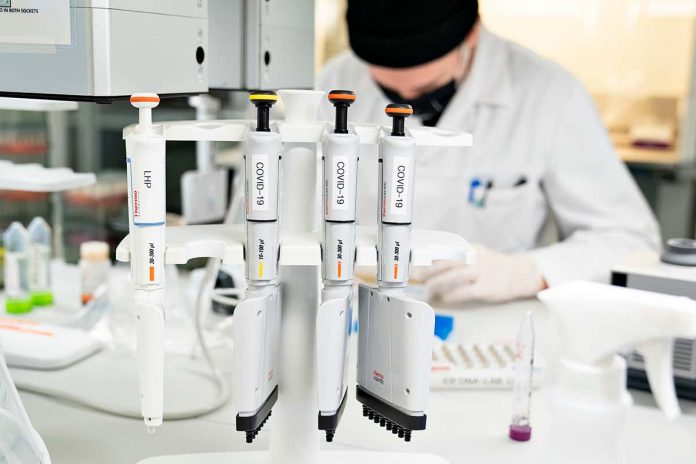
Ritzau Scanpix/AFP via Getty Images
Coronavirus variants are becoming increasingly concerning as they mutate. Samples of the more transmissible B.1.1.7 coronavirus variant, which was first detected in the UK, have acquired a mutation that will help them evade immune protection – the same mutation already present in the B.1.351 variant in South Africa, which is now spreading worldwide.
Local transmission of the B.1.351 variant has been confirmed in the US, several European countries including the UK, Israel and much of sub-Saharan Africa. It isn’t yet clear if B.1.351 is more transmissible, but it is certain that it can partly evade the immunity we develop from natural infection by other coronavirus variants and from vaccines. The big worry is that it could evolve further and completely evade immunity, undermining vaccination efforts.
Lab studies have shown that a mutation called E484K helps B.1.351 to evade antibodies. This same mutation has now been found in 11 B.1.1.7 viruses, according to a UK government document. It doesn’t say when or where these viruses were found.
Advertisement
Ravindra Gupta at the University of Cambridge and his colleagues have already confirmed that this new B.1.1.7 plus E484K variant is better at evading immune protection. In other words, this is a faster-spreading virus that is also better at evading immunity. If it isn’t stopped, it could outcompete the older B.1.1.7 variant, which has already spread to many countries worldwide.
B.1.351 is also going global despite efforts to halt its spread. On 1 February, the UK announced that it had identified 11 cases of B.1.351 that couldn’t be linked to travel, meaning it is spreading within the local community. The UK government has begun testing people in eight areas of England, regardless of symptoms, in an effort to find and eliminate the variant.
The UK has identified 105 cases of B.1.351 altogether, but the rest were linked to travel. Unfortunately, the 11 cases are probably just the tip of the iceberg. The only way to detect the B.1.351 variant is to sequence viral samples, and only about 1 in 20 samples from people who test positive are sequenced. What’s more, many infected people never get tested.
People entering England are meant to self-isolate for 10 days, but it is clear from the spread of other variants during the summer that this isn’t effective. Travel from parts of Africa, South America and Portugal has now been banned, and enforced isolation in hotels will be introduced soon.
On 28 February, officials in South Carolina reported B.1.351 infections in two people with no connection to each other or to travel to South Africa. The US sequences a smaller proportion of viral samples than the UK, so even more cases could be going undetected there.
Local transmission has also been reported in Belgium, Austria and Israel, and in several countries in Africa including Zambia, Mozambique, Botswana and Tanzania. Additionally, a number of other countries including Australia, New Zealand, China and Japan have detected cases linked to travel, but haven’t reported local spread.
With many countries doing little or no sequencing, it is likely that the B.1.351 variant is more widespread than these figures suggest. According to Björn Meyer at the Pasteur Institute in France, when the city of Cologne in Germany started doing a lot more sequencing, it found that 5 per cent of coronavirus infections were due to the B.1.351 variant, revealing that the virus was already well established.
There is also concern about the P.1 variant found in Brazil, which has some of the same mutations as the B.1.351 variant, including the E484K mutation. So far, though, no local transmission of P.1. has been reported outside South America.
Sign up to our free Health Check newsletter for a round-up of all the health and fitness news you need to know, every Saturday
More on these topics:











